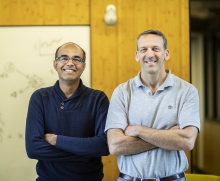Sharing Space to Support ‘Better Science’

In 2010, Penn professors Vijay Balasubramanian, Joshua Gold, and David Brainard had an idea. They recognized that the University had a rich landscape of researchers in disparate schools and departments who were investigating related questions, all dealing with computational neuroscience and how the brain works. They wanted to create an initiative that would build upon that strength.
Balasubramanian, Gold, and Brainard wanted to create a space that would encourage discussion and collaboration between these different researchers, which is how the Computational Neuroscience Initiative (CNI) was born. The professors set up a shared space in the Richards and Goddard laboratories on campus where faculty, students, and postdocs could share ideas.
“I don’t know whether it’s Penn’s history or its small campus,” Brainard says, “but there’s a lot of interaction between faculty here. Interactions across departments and schools are very porous at the faculty level. There was already a lot of collaboration happening between various pieces of the group, but creating the CNI made it easier to facilitate this effort.”
The questions tackled by members of the CNI have implications for everything from neurodegenerative diseases to machine learning and artificial intelligence.
“Neuroscience has been around for a hundred years,” Balasubramanian says, “but in some ways the field is still in its infancy. The brain isn’t just made of one or two neurons—there are a hundred billion interacting neurons. So you need to understand how they work collectively to produce emergent phenomena such as perception, cognition, and sensation. It’s only now, in this epoch, that amazing tools are coming to light for interrogating and understanding the behavior of many, many neurons at once. Building an understanding of the collective behaviors of many neurons acting together is going to absolutely revolutionize what we can do both technologically and medically.”
Click here to read the full story.





